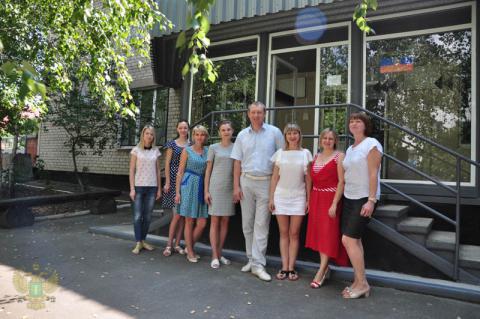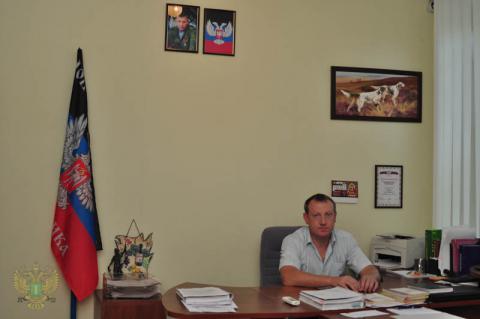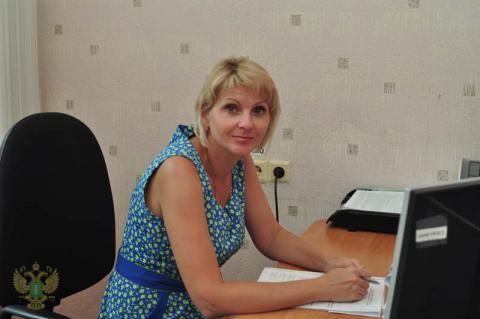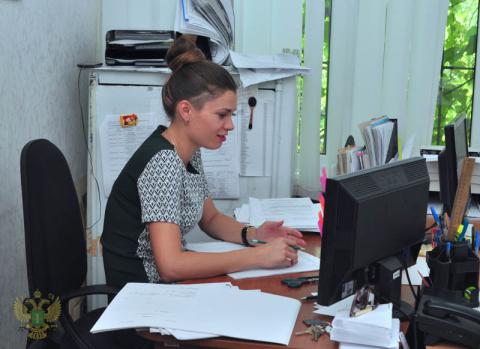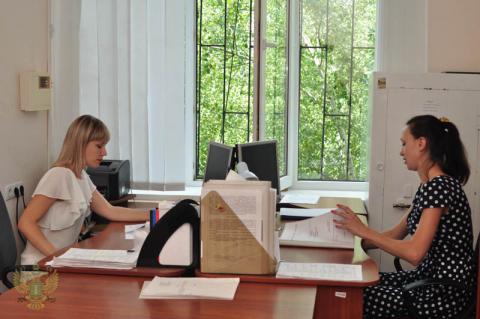 The Novoazovsk District Court was formed in 1972 in a two-storey building specially built for it, and is still located there. Under Ukraine there were five judges in it. About fifty percent of all cases were then related to land disputes, lease agreements.
The Novoazovsk District Court was formed in 1972 in a two-storey building specially built for it, and is still located there. Under Ukraine there were five judges in it. About fifty percent of all cases were then related to land disputes, lease agreements.
After the outbreak of hostilities that reached Novoazovsk, the court was shut down in August 2014. Four judges went to the territory of Ukraine.
This is how Oksana Pichmorga, acting head of the court registry, recalls that period:
In late August, representatives of the district police department sealed the building and really guarded it. There were attempts to take out court cases, office equipment, but they were quickly stopped. Actually one TV set disappeared from the courtroom, but apart from this everything remained intact.
Our city did not become a serious theater of military operations, and the destructions were mainly on the outskirts. At first there were cars with warriors from battalions and the Ukrainian Armed Forces wheeling all over the city. I live on the outskirts and I remember a shelling, and afterwards at 6 am. Ukrainian soldiers came out from the field.
Then, in August, we worked one more day. And in a few days there was a battle, shelling, light and gas were cut off, first armed men entered the city and then in the afternoon – tanks. And we ended up in the DPR. As such, there were no active fights, but this transition was very sharp.
After the establishment of the DPR authority, on February 18, 2015, almost simultaneously with Telmanovo, Novoazovsk district court began its work, already under the jurisdiction of the Donetsk People's Republic. This period was difficult, but the friendly team tried to do its job to the highest standard. Judges had not been appointed yet and the court staff had to go to Donetsk constantly to determine the jurisdiction of the statements of claim and complaints with which people applied to the court, as well as to certify copies of court decisions.
Unfortunately, during the operations the service car of the court was confiscated by the Ukrainian military. Therefore, without its own transport the court staff had to go to Donetsk by public transport, or with police officers and prosecutors.
Finally, in April 2016, two judges were appointed to the Novoazovsk District Court by the decree of the Head of the Republic. These were Popeka Aleksandr Vladimirovich, former judge of the Telmanovo District Court (he was also the chairman of the court), and Ustimenko Petr Petrovich – previously practicing law in the Novoazovsk District.
After that, the court began to operate at full capacity.
Now the Novoazovsk District Court functions as normal: only during the first half of 2017, the court registered 547 cases and materials, of which 439 have been already considered, that is, the overwhelming majority. Of the total number of cases, civil ones still prevail, among which leadership is held by disputes arising from family legal relations –42 cases of this nature have been already heard, the court has also heard 39 cases of inheritance.
Life of the court is not confined to litigations only. It is also important that legal proceedings are carried out in conditions that are comfortable both for the employees of the judicial system and for visitors. Today the Novoazovsk court, which has survived quite hard times (water and light shortages caused by military actions, problems with sewerage and communications), is changing thanks to the efforts of the employees themselves and the administrative and economic management of the Judicial Department of the Supreme Court of the DPR. There were replaced external and internal water pipes, which have not been changed since the construction of the building, plumbing fixtures have also been replaced. The court staff did not even dream about such changes in our difficult times, and are very grateful to everyone who took part in the process of renovation. Apart from this, videoconferencing was reinstalled, the Internet connection was made.
Cases heard in the Novoazovsk court, as mentioned above, are of different nature. Although, of course, priority belongs to civil cases. During the period when the judicial system was absent: after a criminal decision by the Ukrainian regime to withdraw judges from the territory of the former Donetsk region until the period of the emergence and formation of the judicial system of the Donetsk People's Republic, there have been accumulated many common everyday cases: divorce, inheritance, alimony, etc. What is important is that judges, becoming much freer in their actions, are not afraid to render decisions protecting the rights of ordinary citizens in their disputes, even with power structures.
Employees of the Novoazovsk district court use beat endeavours to ensure that the court has changed from the place of sale and purchase of "sentences" and "judgments" that existed in Ukrainian realities, into the structure of real protection of the rights and freedoms of citizens.

